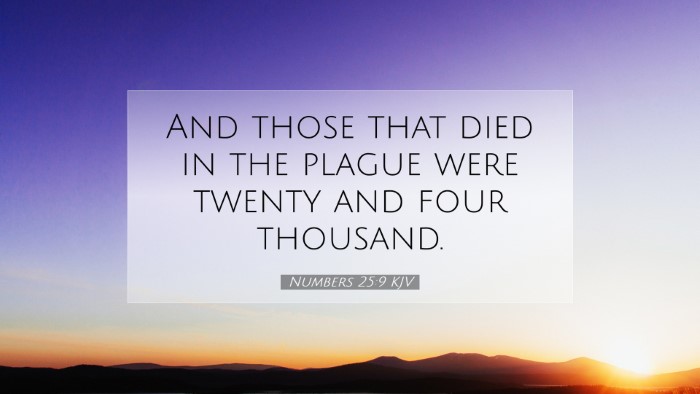Commentary on Numbers 25:9
Bible Verse: "And those that died in the plague were twenty and four thousand." (Numbers 25:9)
Introduction
This verse concludes the tragic account of Israel’s sin at Peor. It exemplifies the seriousness of turning away from God and the consequences that follow. Scholars and theologians have often examined this passage to understand the nature of sin, divine judgment, and the relentless grace of God.
Contextual Overview
Numbers 25 depicts a crucial moment in Israel's wilderness journey. The Israelites, compromised by the idolatry and immorality of the Moabites, faced devastating consequences as a result of their disobedience. This chapter reveals how interwoven their spiritual and national identities were and sets the stage for God’s disciplinary response.
The Nature of the Sin
The sin described includes both idolatry and sexual immorality. As noted by Matthew Henry, "They joined themselves to Baal-peor," a direct violation of the covenant God made with Israel (Numbers 25:1-3). This sin was not merely incidental; it was a flagrant rejection of God’s holiness and guidance.
Divine Judgment
Albert Barnes points out that the death toll resulting from the plague—24,000—serves as a sobering reminder of the consequences of sin. The scripture reiterates that "the wages of sin is death" (Romans 6:23), illustrating how sin brings forth death not just spiritually but physically at times, particularly in the community of faith.
Significance of the Number
Adam Clarke notes that the number "twenty and four thousand" is significant, illustrating the vast impact of collective disobedience. This was not merely an act of individual error but a communal falling away, reinforcing the idea that the sins of a few can ultimately lead to the judgement of many.
Theological Implications
This verse provides deep insights into the nature of God’s holiness and expectations of His people. It emphasizes both God’s justice and the seriousness with which He addresses sin. The death of so many serves as a manifestation of divine wrath but also as a warning for future generations.
God’s Holiness and Justice
The holy nature of God cannot tolerate sin. As seen in the punishment of the Israelites, divine justice often follows when God’s people stray. This is a recurrent theme throughout scripture; God’s holiness demands accountability. Matthew Henry explains that this should invoke fear in the hearts of believers—a healthy reverence for the God who is both loving and just.
“Let this be a solemn warning to all professing Christians,” Henry concludes, “to avoid the paths that lead to compromise with worldly practices.”
The Nature of Repentance
Furthermore, one could examine the implications of repentance in the wake of such judgment. The overwhelming loss of life can instigate a solemn reflection on the nature of turning back to God. The account invites leaders and congregations to consider the need for genuine repentance and the role of accountability in community.
- Call to Repentance: Reflects the necessity for individuals to return to God and reject sinful influences.
- Community Accountability: Encourages collective vigilance to maintain spiritual integrity.
- God’s Mercy amidst Judgment: Reminds us that the plague serves also to purify and call the faithful back to God.
Application for Today
In today’s context, this verse serves as a dire reminder of the outcomes of spiritual indifference and moral compromise. The contemporary church must wrestle with similar challenges, facing societal pressures that can lead individuals and entire communities astray.
For Pastors and Leaders: This passage emphasizes the importance of teaching sound doctrine and encouraging congregants to pursue holiness. Leaders are called to guard against influences that may lead their flocks into moral ambiguity.
For Students and Scholars: The analytical study of this incident illustrates the interplay between individual and corporate faith. It invites further exploration into the historical and cultural contexts of the ancient Near East and God’s responses therein.
Conclusion
Numbers 25:9 encapsulates a pivotal lesson in the narrative of Israel—the high cost of disobedience. While God’s judgment is evident, so too is the call to repentance and return. As readers engage deeply with this text, may we allow it to inform our understanding of sin, accountability, and ultimately, the grace that restores.
This commentary draws upon the wisdom of Matthew Henry, Albert Barnes, and Adam Clarke, aiming to provide a comprehensive understanding of the teachings derived from Numbers 25:9 for all who seek to deepen their theological reflections.


